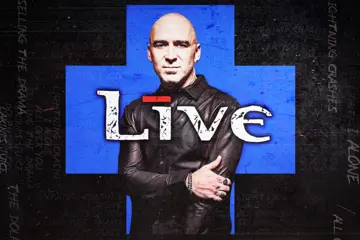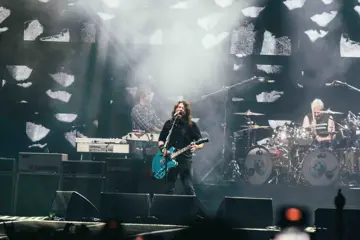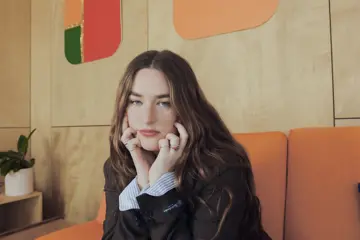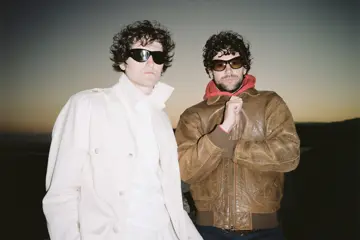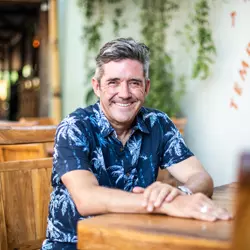 Adam Gibson
Adam GibsonOn The Punt
A song that has taken on a life of its own, this was never conventionally released as a “single” yet has travelled far and wide over the years, getting airplay and much love in a wide array of places. To my surprise and happiness, of course. It seems to tap into something universally “Australian” and something also concerned with parents, and specifically memories of many people’s fathers. It’s a snapshot from my own childhood of “long drives in hot cars” across the highways of Australia with the races on the radio and I get messages on a regular basis from people who have first heard it and have been affected by it. It was the first song on the first Aerial Maps album and actually the first song we recorded for the band, so it’s really become the “key” track at the centre of everything I’ve been doing for the past 20 or so years. And it’s bloody fun to play live.
The Band's Broken Up
In a similar way to On The Punt, this song wasn’t ever really a “single” but has aged well for me over the years and every now and then it has a revival and is played on radio/TV around the place. We recorded it with Modern Giant and it probably marks the first time that we got the whole “spoken word with singing” thing properly right. Describing a life of seeing bands and living to go out at night and soak up the thriving band scene of Sydney in the '90s, I guess it’s a snapshot of my own younger days, being a “fan” and haunting the hallowed band pubs of Sydney of the era - the Hopetoun, the Annandale and the Lansdowne. Loud and late nights where the band you saw or were seeing really could change your life. Times move on of course and scenes change, but I like to think this song captures something “of the moment”.
Heartbeat
Another Modern Giant song that means a lot to me and all of us in that band. Heavily influenced by Midnight Oil and their early Australian “coastal” imagery, we wanted to describe a life that’s lived up and down the Pacific Highway, the small towns and lives lived in coastal hamlets beneath the mozzie zapper, with the lure of the Big City never far away but with the equal lure back to the Small Town being strong too. Purposefully drenched in chorus pedal guitars to echo the sound of a certain era of Australian music, this is the first time I realised we could try to tackle some sort of “epic” storytelling that wasn’t bound by a conventional song structure.
Be Home Before The Streetlights Go On
The first Aerial Maps album was in a sense a “concept album” that looked at nostalgia and a sense of wanting to connect with an Australia of the past. Some people didn’t quite get that and thought I was mired in a sentimentality for things past. But I actually was trying to celebrate those memories - the backyard paling fence, the amber glow of my Australian childhood - and that idea was probably best distilled in Streetlights. My brother Simon had this chord progression and one day he started playing it and the words just sort of tumbled out without any editing, just wholly formed and somehow right on the button of what I wanted to try to get across.
Long Time Dead
Don't miss a beat with our FREE daily newsletter
This compilation is not tracklisted in a chronological manner, rather it is ordered by placing songs alongside others that they seemed to fit with. Long Time Dead is an Ark-Ark Birds song in which I sought to undercut the idea that I was stuck in the past, as seen in Streetlights. The idea being that the past can actually serve to hold you back and that you need to look forward and live your life right now because “you’re a long time dead”. As I say in the song, “They weren’t better days/ Just younger ones/ And the sooner you realise/ The better for everyone.” This song has taken on greater resonance in recent years as the chorus refrain is sung by Simon Holmes, who sadly passed away just a couple of years after this was recorded. It’s a very emotional connection for me and all of my friends, Holmesy being a key figure behind not only the Aerial Maps, The Ark-Arks and Modern Giant, but his band The Hummingbirds being one of the most important bands ever for all of us, and in a large part his memory being the reason this compilation was put together.
Trivia Night
As an adjunct to Long Time Dead, Trivia Night is connected to another close friend who passed away. Sam de Brito was an author and columnist who was one of my closest friends. He and I had been through a lot together and his sudden death from misadventure, not suicide, really rocked my close connections and I. He was a crazy and somewhat controversial figure, but was much-loved by all those close to him and he truly loved art and music and literature. This song was written in his honour, honouring our friendship and connection and the love you feel for your close friends. I still miss the stupid bugger, but just know he’d be happy that he’s finally been namechecked in a song.
Indian-Pacific
Several years ago I travelled by train, on the Indian-Pacific, across Australia from Sydney to Perth and then back again. It was a deeply affecting journey and I loved the way that railways could slice you through such a vast continent with apparent ease. I started to think of train tracks as a “horizontal scaffold” on which the nation was built and in this song I wanted to articulate a cut-up vision of Australia, just like the glimpses you get from a train as you hurtle past the landscape. We recorded this as an Ark-Ark Birds’ song, but it could very easily be from any of my bands, with a political undertone that I really enjoy.
The Years Nobody Cared What You Did
Growing up in a surfside suburb of Australia in a certain era I got to know many “coastal” people who lived by drifting up and down the coast, surfing here and working there, getting by via their wits and often no discernible means of support. This was an era though when that was possible, when you could do what you basically wanted to do, without someone keeping track of you or ordering you to do this or that. The authorities didn’t want to keep note of you and a successful life could easily be led without any of the conventions of society. This track talks about such an era, where a bloke takes possession of an old truck and decides he might live in the carpark beside Currumbin Surf Club for a year. No one bothering him, no worries. Why not?
Salvation Road
Recorded for the Aerial Maps’ second album The Sunset Park, this song was very much driven by Simon Holmes. Using a “wall of sound” recording technique with three drummers playing the same part live in studio and with layers of guitars beneath Sean Kennedy’s keyboard lines, this was envisaged as a triumphant song that spoke to the freedoms of the Australian wide open road. With the main vocal sung by Holmesy and deliberately quoting The Triffids, I wanted to address the thrill and excitement that can overcome you when you finally break the shackles of the city and hit that “road open wide”.
New York '54
As a child my parents had taken my brother and I on a big trip to the United States. Dad was playing a big concert at the UN in New York and we spent weeks exploring the city, something which has always been etched on my soul as a formative experience. As such I’ve always held the “idea” of New York as a dream, a vision, a mythic place to aspire to… something, of course, that millions of other people also feel. This is a Modern Giant song in which the dream of New York meets the reality of the protagonists’ hometown of Adelaide, where the couple involved try to reconcile their big days in NYC with the reality of Rundle St East and how “on clear star nights” they realise that whilst the reality of New York has faded, the memories remain. This song connects Springsteen and Kerouac with the Australian desert – something that makes me happy!
Angie Hart
In the late '80s and early '90s, Angie Hart, from the band Frente, represented to me the dream of Melbourne. She symbolised the lure of the city and the women there that I imagined falling in love with. So whilst this song is called Angie Hart, it is more a love letter to the idea of Melbourne than necessarily a paean to Angie. The interesting thing is, when I wrote this I’d never met Angie but she did eventually hear the song and from that we connected and subsequently did a few shows together; one at which I performed this song and she then did a reply in kind, responding directly to my words. A beautiful occasion and she remains a brilliantly talented performer and wonderful person.
London Still Exists
In the mid-'90s I, like most from my generation of Australians, went to London on a rites of passage mission. It was just something you did. The result being lots of drinks in Fulham pubs, big nights at Earl’s Court, huge afternoons at Portobello Rd. And also shit jobs here and there just to get by before you had to leave when your work visa expired. I found myself working on a building site (as a labourer) in Soho at one point. I was assigned as an offsider to an incomprehensible Scottish bloke name Pete, who was rough as guts but turned out to be a top fella. I had no idea what I was doing, was utterly hopeless at the job, but through that freezing winter, old Pete showed me a whole new world of working class London and this song looks at that world.
Dead Europe
Over the years since that trip in the '90s I have returned to Europe on several occasions. I have lived in Paris and pottered about in a number of different cities and countries. At one point I became particularly enamoured of Finland and spent several months there in a regional town. On one of those trips I embarked on a big arc through Europe and midway through I think I realised I wasn’t in the best state of mind. Yet I continued on and trekked through Stockholm, Paris, then onto Barcelona and then back up to Warsaw. This song isn’t some big commentary on Europe but more articulates a personal journey, one on which I knew I needed to return home ASAP.
Blanchey
Recorded for the first Ark-Ark Birds album, this is a real story about a specific event that occurred in my family, but it also seeks to tell the story of Australia through the 20th century. Just a small topic! But I wanted to sketch the century by using the device of my own family’s story as the scaffold on which that story could be told. I tried to capture the yearning sense of Australia through the World Wars and everything else and how all that intertwined with the essential lives and loves of people. And of course it also namechecks one of my great loves – Rugby League.
The Great Australian Silence
The great raw landmass of Australia has always weighed heavily on my psyche, like a physical presence that has always been there, exerting power and weight and heft. I have done many trips to the Outback and on one essential occasion, drove across the breadth of the entire country, from west coast to east coast, soaking up all that land and road and far horizon. This song is probably my overall favourite of everything I’ve done, capturing the great quiet - the great silence - of Australia in some way. For me, anyway. Very unashamedly influenced by Not Drowning Waving, this all feels pretty “right” to me.
Belanglo, Byron And The Road Between
In my late teens and early 20s, I worked as a reporter on major Sydney newspapers. At one point I was assigned as an offsider to the Chief Police Reporter and covered many and various dastardly deeds carried out by nefarious individuals throughout the country. It was a profoundly affecting time for me, us cadet journos just thrown out with no experience or counselling to cover murders and stabbings and drug busts and deaths by misadventure. This track painstakingly describes my involvement with the Ivan Milat backpacker murders of the era. I was one of the first journos to go to the Belanglo State Forest when the first of the victims’ bodies were found and the whole experience had a massive impact on me. I now see that there is a real “before and after” of the Backpacker Murders, for both myself and Australia. Something was lost forever when they occurred. My brother wrote all the music for this one and the intensity of it hits me hard – in a good way!









